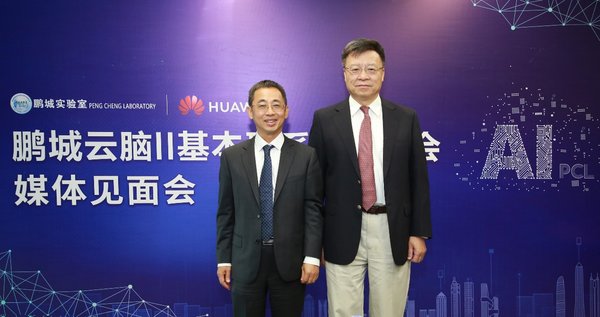SHENZHEN, China, Dec. 3, 2019 /PRNewswire/ -- On November 29, 2019, Huawei and Peng Cheng Laboratory (PCL) jointly released Peng Cheng Cloud Brain II Phase 1, officially launching the journey to AI clusters at 1000 petaFLOPS (PFLOPS) scale. This marks a new milestone in the scientific research field for the Kunpeng computing industry. Running at the bedrock of Cloud Brain II is the Huawei Atlas 900 AI cluster, powered by the Huawei Kunpeng and Ascend processors. Atlas 900 infuses robust computing power into Cloud Brain II, supporting basic research and exploration in the AI field, such as computer vision, natural language, autonomous driving, smart transportation, and smart healthcare. The computing power of Peng Cheng Cloud Brain is currently 100 PFLOPS, planned to scale to 1000 PFLOPS and higher next year.

"This September, Huawei embarked on the Kunpeng + Ascend dual-engine computing strategy. Inspired by this strategy, we are committed to providing the ultimate computing power to the world. We also released Atlas 900, the world's fastest AI training cluster," said Hou Jinlong, Senior VP of Huawei, and President of Huawei Cloud & AI Products and Services.
"Today, we're proud to see Atlas 900 selected for the Peng Cheng Cloud Brain II project. It lays the cornerstones for Cloud Brain II. Cloud Brain II is an industry-leading AI research platform. PCL has brought together many academicians and AI research talents. Huawei will join PCL in spearheading forefront scientific research for an intelligent world," Hou added.
Hou also said, "Right now we are building Cloud Brain II Phase 1. I believe that, with our joint effort, this will pave the way to a Cloud Brain II at 1000 PFLOPS scale in the near future. We are confident that it will become a world-leading AI research platform."
Michael Ma, President of Huawei's Intelligent Computing Business Dept, said, "Huawei builds the Atlas AI computing platform based on the Ascend processors, providing a broad portfolio of modules, cards, edge stations, AI servers, and clusters. Our all-scenario AI infrastructure covers the cloud-edge-device, supporting full-pipeline inference and training for deep learning."
"Our flagship Atlas product, Atlas 900, stands as the pinnacle of AI computing in the world. The combination of Atlas 900 and Cloud Brain II will embark on a new chapter for AI clusters at 1000 PFLOPS scale, and unlock superb computing power to drive faster intelligent transformation across industries," said Ma.
Peng Cheng Cloud Brain is a key technology facility in the field of AI. It is a basic research platform for exploring the frontier of AI technology. Currently it boasts an AI computing power of 100 PFLOPS, and is expected to reach 1000 PFLOPS scale in the Cloud Brain II project next year.
Cloud Brain II is jointly built by PCL and Huawei. Running on Huawei Kunpeng and Ascend processors, the Atlas 900 AI cluster provides superior computing power. PCL develops Cloud Brain technologies at 1000 PFLOPS.
The Atlas 900 AI cluster has inherited Huawei's technology know-how of over a decade. Composed of thousands of Ascend 910 AI processors, Atlas 900 completes training of a ResNet image classification model in 59.8s, 10 seconds faster than the previous world record at the same precision. The powerful computing capability of Atlas 900 delivers a difference in scientific research and technology innovation, such as astronomical exploration, weather forecasting, autonomous driving, and oil exploration. Atlas 900 highlights:
Up to now, based on the Ascend 910 and 310 AI processors, Huawei has launched the Atlas 900 AI cluster, Atlas 800 AI server, Atlas 500 AI edge station, Atlas 300 AI accelerator card, and Atlas 200 AI accelerator module. The holistic Atlas portfolio provides powerful computing for training and inference in all scenarios across cloud-edge-device.
Looking ahead, Huawei will continue to step up investment and innovation in infrastructure such as processors, operating systems, and databases for the Kunpeng computing industry, and provide AI computing for Peng Cheng Cloud Brain, together bringing AI technology faster to reality for a wider scope of application.
Photo - https://photos.prnasia.com/prnh/20191203/2659308-1-a?lang=0
Photo - https://photos.prnasia.com/prnh/20191203/2659308-1-b?lang=0